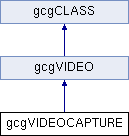|
| | gcgVIDEOCAPTURE () |
| | Constructs a valid video capture object. The capture actually starts with calls to setCallBackFunction() and openCamera(). More...
|
| |
| virtual | ~gcgVIDEOCAPTURE () |
| | Releases all video capture resources by calling destroyVideo(). More...
|
| |
| virtual bool | destroyVideo () |
| | Releases all resources of this video capture object. More...
|
| |
| virtual int | getNumberOfCameras () |
| | Returns the number of valid cameras installed in the system. More...
|
| |
| virtual bool | getCameraName (unsigned int id, char *pCameraName, unsigned int maxName) |
| | Gets the human readable name of the capture device given its integer identification. More...
|
| |
| virtual bool | openCamera (unsigned int id, unsigned int width, unsigned int height, unsigned char bpp, float fps) |
| | Opens the capture device and makes it ready to start image retrieval. More...
|
| |
| virtual bool | start () |
| | Starts synchronous capturing. If successful, the capture starts from the device indicated by the previous call to openCamera() and the frames are delivered to the callback set by setCallBackFunction(). More...
|
| |
| virtual bool | stop () |
| | Stops synchronous capturing. If successful, the capture stops. It generally releases some video resources. For a faster restart, use pause() instead. More...
|
| |
| virtual bool | resume () |
| | Resumes synchronous capturing. If successful, the capture restarts. More...
|
| |
| virtual bool | pause () |
| | Pauses the synchronous capturing. More...
|
| |
| virtual bool | isCapturing () |
| | Returns true if the object is currently capturing, i.e., not stoped. More...
|
| |
| virtual bool | setCallBackFunction (void(*callback)(gcgVIDEOCAPTURE *)) |
| | Sets the callback function for the current object. It should be called before start(). Changing the internal function during the capture might give undesirable results. The callback function receives a pointer of the gcgVIDEOCAPTURE object that is delivering the new frame. The callback must return as fast as possible otherwise the video capture stream will be delayed. This might result in frame losses or instability depending on the system. More...
|
| |
| virtual double | copyFrameTo (gcgIMAGE *dstimg) |
| | Copies the last delivered frame into a gcgIMAGE object. It is generally used during a call to the callback function defined by setCallBackFunction() in order to get a copy of the new frame. More...
|
| |
| | gcgVIDEO () |
| | Constructs a valid but empty image. The image can be used as destiny image in any gcgIMAGE method or GCGlib function. More...
|
| |
| virtual | ~gcgVIDEO () |
| | Releases all video resources by deleting the video handler. More...
|
| |
| void * | operator new (size_t size) |
| | Defines a new operator to be used by instatiations of GCGlib classes instead the global one. More...
|
| |
| void * | operator new (size_t size, const std::nothrow_t &) throw () |
| | Defines a new operator to be used by instantiations of GCGlib classes instead the global one. Returns a NULL pointer instead of throwing an exception if an error occurs. More...
|
| |
| void * | operator new[] (size_t size) |
| | Defines a new operator to be used by GCGlib array allocations instead the global one. More...
|
| |
| void * | operator new[] (size_t size, const std::nothrow_t &) throw () |
| | Defines a new operator to be used by vector allocations instead the global one. More...
|
| |
| void | operator delete (void *p) |
| | Defines a delete operator to free instances of GCGlib classes instead the global one. It is designed to match the new operator. More...
|
| |
| void | operator delete (void *p, const std::nothrow_t &) throw () |
| | Defines a delete operator to free instances of GCGlib classes instead the global one. It is designed to match the new operator. More...
|
| |
| void | operator delete[] (void *p) |
| | Defines a delete operator to free instances of arrays for GCGlib classes instead the global one. It is designed to match the new[] operator. More...
|
| |
| void | operator delete[] (void *p, const std::nothrow_t &) throw () |
| | Defines a delete operator to free instances of arrays for GCGlib classes instead the global one. It is designed to match the new[] operator. More...
|
| |
Class for capturing video from camera devices.
The gcgVIDEOCAPTURE class is the main interface of GCGlib with camera devices. It uses platform specific objects and APIs. The camera is identified by its sequencial integer number. The capture mechanism is synchronous using a callback funtion. The video frames are provided by gcgIMAGE objects. Do not change any attributes unless you are absolutely sure about you are doing.
- Since
- 0.01.6



 Public Member Functions inherited from gcgVIDEO
Public Member Functions inherited from gcgVIDEO Public Member Functions inherited from gcgCLASS
Public Member Functions inherited from gcgCLASS